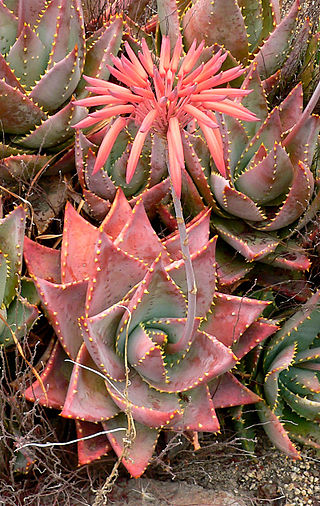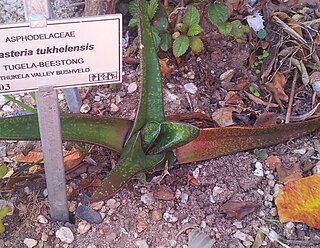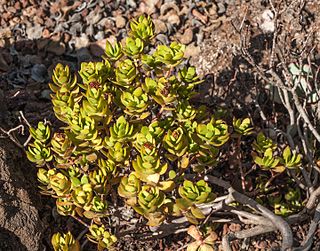
Haworthia is a large genus of small succulent plants endemic to Southern Africa (Mozambique, Namibia, Lesotho, Eswatini and South Africa).

Gasteria is a genus of succulent plants, native to South Africa and the far south-west corner of Namibia.

Gasteria excelsa is a succulent plant, native to the Eastern Cape Province, South Africa.

Aloe ferox, commonly known as bitter aloe, is a species of flowering plant in the family Asphodelaceae. This woody aloe is indigenous to southern Africa. It is one of several Aloe species used to make bitter aloes, a purgative medication, and also yields a non-bitter gel that can be used in cosmetics.

Aloe perfoliata, the rubble aloe or mitre aloe, is a hardy creeping aloe, found in rocky, mountainous areas throughout the Western Cape, South Africa.

Pereskia aculeata is a scrambling shrub in the family Cactaceae. Common names include Barbados gooseberry, blade-apple cactus, leaf cactus, rose cactus, and lemonvine. It is native to tropical America. The leaves and fruits are edible, containing high quantities of protein, iron and other nutrients, and it is a popular vegetable in parts of the Brazilian state of Minas Gerais under the name of ora-pro-nóbis.

Crassula capitella, is a perennial succulent plant native to southern Africa.

Dudleya attenuata is a species of perennial succulent plant known by the common name taper-tip liveforever, native to Baja California and a small portion of California. A rosette-forming leaf succulent, it has narrow pencil shaped leaves that can often be found covered in a white epicuticular wax. The thin, sprawling stems branch to form the clusters of rosettes, with plants creating a "clump" up to 40 cm wide. The small flowers are white or yellow, with 5 spreading petals. It is a diverse, variable species that extends from the southernmost coast of San Diego County to an area slightly north of the Vizcaino Desert, hybridizing with many other species of Dudleya in its range. Some plants with white or pinkish flowers were referred to as Orcutt's liveforever, referring to a former subspecies split on the basis of the flower color.

Aloe pluridens is an arborescent aloe indigenous to southern Africa.

Gasteria acinacifolia is succulent plant native to the Eastern Cape Province, South Africa.

Crassula nudicaulis is a succulent plant native to South Africa, and Lesotho.

Gasteria bicolor is a species of succulent flowering plant in the family Asphodelaceae, native to the Eastern Cape, South Africa.

Gasteria nitida, the Bathurst gasteria, is a succulent plant, native to the Eastern Cape grasslands of South Africa.

Gasteria batesiana is a species of succulent plant, native to the inland escarpment in the far north-east of South Africa.

Gasteria carinata is a small and variable succulent plant, native to the Western Cape Province, South Africa.

Gasteria tukhelensis is a species of succulent plant, native to the Tugela River valley, in KwaZulu-Natal Province, South Africa.

Gasteria polita, the polished gasteria, is a recently discovered succulent plant, restricted to a locality in the Afro-temperate forest of the Western Cape, South Africa.

Kalanchoe longiflora, also known as tugela cliff-kalanchoe or long-flower kalanchoe, is a species of the succulent genus Kalanchoe, in the family Crassulaceae. An obscure shrub native to South Africa, it is known for its multi-coloured foliage and yellow flowers, which bloom in autumn to winter.

Crassula cultrata is a succulent plant native to the southern parts of South Africa.
Plectranthus purpuratus or cliff spurflower is a species of flowering plant in the family Lamiaceae, native to South Africa's Kwazulu-Natal and Mpumalanga provinces, as well as eSwatini. The name is frequently misapplied to Plectranthus ciliatus, presumably because both have purple-backed leaves.




















